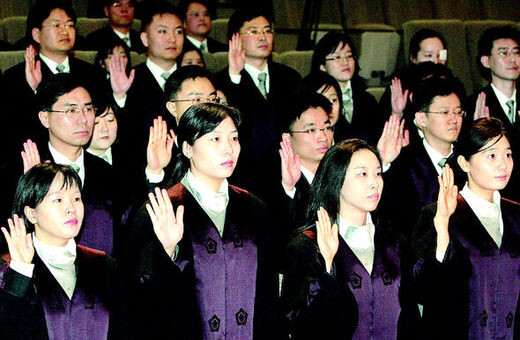hankyoreh
Links to other country sites 다른 나라 사이트 링크
Seoul’s wealthy districts produce large portion of judges

Graduates of Seoul high schools located south of the Han River or specializing in foreign languages accounted for about a third of newly appointed judges last year.
Seoul’s southern section, known generally as "Gangnam" - though this also refers to a smaller district in the same area - is the location of a concentration of its wealth. Foreign-language high schools rank among Seoul’s most elite public schools.
If such a situation worsens, it will limit the ability to establish unbiased legal precedents, some observers said.
An analysis performed by the Hankyoreh showed that of judges serving between 2004 and 2006, 27.65 percent graduated from foreign language high schools and schools located in the Gangnam area last year, compared to 14.91 percent in 2004 and 23.9 percent in 2005. If such a tendency continues, the figure is expected to increase to almost 50 percent by 2010.
Some have raised concerns that if such a situation is not corrected, it may result in the production of precedents which are indifferent to protecting those less fortunate. In that case, legal proceedings related to social welfare policies and social administration will not sufficiently consider the situation of the low-income strata of society.
"Such a situation will not seriously affect simple civil and criminal cases, but the judges’ values formed through their home background will affect cases related to policies such as real-estate taxes or cases requiring constitutional judgment," a judge at a Seoul court said on condition of anonymity.
A judge who has been working at the Seoul Administrative Court for over 15 years said, "As judges earn a lot of money and have social power, they are leaning toward the Right politically. They should try to put themselves in the shoes of the socially unempowered."
Park Geun-yong of the People’s Solidarity for Participatory Democracy said that "if judges are produced from the upper class in large numbers, it is highly probable that they will give biased decisions on cases involving large companies."
A 2003 paper written by Yonsei University professor Lee Jong-su said that in Germany in 1964, almost half of the judges came from backgrounds in the upper income bracket. In addition, the German judiciary was criticized as restricting left-wing students from being appointed as judges by introducing a strict screening system for official appointments. Due to this situation, German society was swept by "a reliability crisis of the judiciary" for showing such an inclination toward favoring the upper classes, according to the paper.
In many ostensibly democratic societies, wrote Lee, "the function of the judiciary is as a ladder to advance ’independent status to a privileged nobility.’ "
The Supreme Court, however, said, "We have not heard of legal proceedings or rulings which had been affected by such a situation. Therefore, we have not taken any measures."
Please direct questions or comments to [englishhani@hani.co.kr]
Editorial・opinion
![[Column] Season 2 of special prosecutor probe may be coming to Korea soon [Column] Season 2 of special prosecutor probe may be coming to Korea soon](https://flexible.img.hani.co.kr/flexible/normal/500/300/imgdb/original/2024/0426/3317141030699447.jpg) [Column] Season 2 of special prosecutor probe may be coming to Korea soon
[Column] Season 2 of special prosecutor probe may be coming to Korea soon![[Column] Park Geun-hye déjà vu in Yoon Suk-yeol [Column] Park Geun-hye déjà vu in Yoon Suk-yeol](https://flexible.img.hani.co.kr/flexible/normal/500/300/imgdb/original/2024/0424/651713945113788.jpg) [Column] Park Geun-hye déjà vu in Yoon Suk-yeol
[Column] Park Geun-hye déjà vu in Yoon Suk-yeol- [Editorial] New weight of N. Korea’s nuclear threats makes dialogue all the more urgent
- [Guest essay] The real reason Korea’s new right wants to dub Rhee a founding father
- [Column] ‘Choson’: Is it time we start referring to N. Korea in its own terms?
- [Editorial] Japan’s rewriting of history with Korea has gone too far
- [Column] The president’s questionable capacity for dialogue
- [Column] Are chaebol firms just pizza pies for families to divvy up as they please?
- [Column] Has Korea, too, crossed the Rubicon on China?
- [Correspondent’s column] In Japan’s alliance with US, echoes of its past alliances with UK
Most viewed articles
- 1[Column] Season 2 of special prosecutor probe may be coming to Korea soon
- 2‘We must say no’: Seoul defense chief on Korean, USFK involvement in hypothetical Taiwan crisis
- 3Is N. Korea threatening to test nukes in response to possible new US-led sanctions body?
- 4No good, very bad game for Korea puts it out of Olympics for first time since 1988
- 5Is Japan about to snatch control of Line messenger from Korea’s Naver?
- 6Division commander ordered troops to enter raging flood waters before Marine died, survivor says
- 7Korea’s 1.3% growth in Q1 signals ‘textbook’ return to growth, says government
- 8N. Korean delegation’s trip to Iran shows how Pyongyang is leveraging ties with Moscow
- 9[Editorial] Korea’s surprise Q1 growth requires objective assessment, not blind fanfare
- 10[Editorial] Government needs to stop impeding Sewol mourning